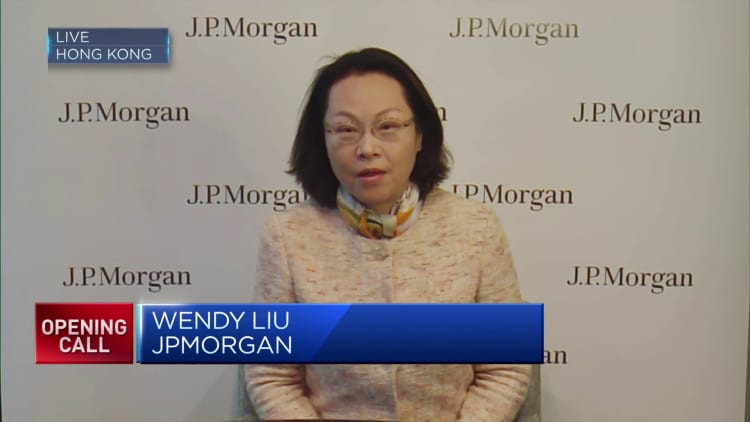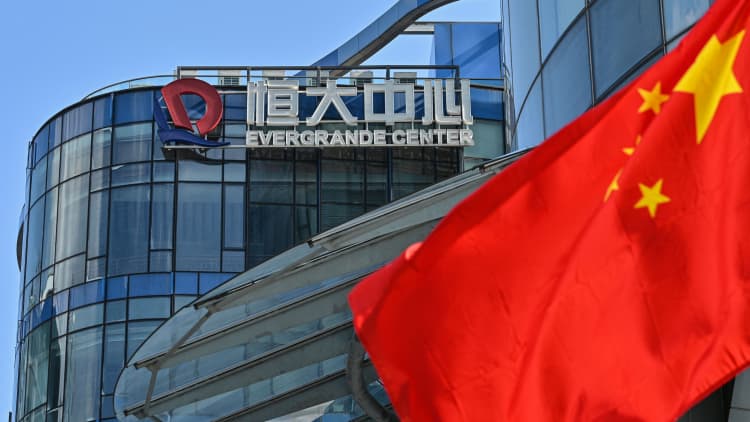BEIJING — China pledged to reduce the amount of liquidity that its banks are required to hold as reserves early next month in a bid to boost its struggling economy.
Reserve ratio requirements for banks will be cut by 50 basis points from Feb. 5, which will provide 1 trillion yuan ($139.8 billion) in long-term capital, Pan Gongsheng, the People's Bank of China governor, said at a press conference in Beijing Wednesday.
This is the first reduction in reserve requirements this year, after two cuts last year. The PBOC also said Wednesday there's room for further monetary policy easing. Reducing the reserve requirements that banks must maintain will increase the capacity for lenders to extend loans and spur spending in the broader economy.
Pan also told reporters the central bank and the National Financial Regulatory Administration have been working on new policy to support loans for high-quality real estate developers — and that details would be released later Wednesday or Thursday.
He did not elaborate further on real estate issues, but said local government debt problems were mostly in underdeveloped regions, "which has limited impact on the economy and finance in aggregate.” That's according to a CNBC translation of the Chinese comments.

China's real estate troubles are closely intertwined with local government finances since they typically relied on land sales to developers for a significant portion of revenue. The property market has slumped after Beijing cracked down on developers' high reliance on debt for growth in 2020.
Stocks in Hong Kong and China extended gains in the last hour of trade, while yields on China's 10-year government bonds crept marginally lower after the news. China vowed Monday to "strengthen the market's inherent stability" amid a rout in the country's onshore and offshore stock markets.
Pan acknowledged Monday's meeting and recent interest in what he called the "capital market." He said the central bank would work to create good conditions for financial markets.

His announcements of the forthcoming reserve ratio requirement cut and real estate policy document also marked a rare decision to release news during the press briefing. Such policy moves are typically only published online and disseminated via state media.
"The 0.5 percentage point cut was early and powerful, showing that prudent monetary policy pays more attention to stable expectations, quick results and sufficient accuracy," Bruce Pang, chief economist and head of research for Greater China at JLL, said in Chinese, via a CNBC translation.
International changes
Data released last week showed the world's second-largest economy grew 5.2% in 2023, broadly in line with official projections. Its fourth-quarter GDP print also stood at 5.2%, but fell just shy of economists' median estimates.
China's post-Covid economic recovery has been lackluster, with China's top leaders warning the process would be "tortuous."
However, on the international macroeconomic front, a major change this year is that the U.S. Federal Reserve is widely expected to start cutting rates, following aggressive interest rate hikes. High U.S. rates have made it more attractive for international investors to park cash in U.S. dollar assets, while putting pressure on the Chinese yuan.
Beijing did not embark on massive stimulus in the wake of the pandemic but kept monetary policy relatively loose versus the U.S. and Europe.
The PBOC's Pan pointed out that this year, the gap between U.S. and Chinese monetary policy cycles would narrow.
"Such a change in the external environment, is objectively beneficial for strengthening the autonomy of China's monetary policy operations and expanding the space for monetary policy operations," he said.
Beijing is seeking to bolster growth in a targeted manner, while engineering a deleveraging of its once-bloated real estate sector, with some of its largest property developers facing serious debt problems. This has intensified financial risks and roiled consumer confidence, as consumer prices teeter on the verge of deflation.
Pan pointed out the consumer price index rose by just 0.2% in 2023, which he described as a "significant decline" from a year ago. He noted that within China, there's insufficient demand, overcapacity in some industries, weak societal expectations about the future and low price levels.
In terms of monetary policy, Pan said "maintaining price stability and promoting a moderate price recovery" is an important consideration.



